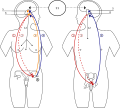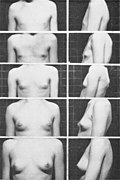Puberty
Puberty is the period in human development during which physical growth and sexual maturation occur, marking the transition from childhood to adulthood. It is characterized by the development of secondary sexual characteristics, such as breast development in girls, growth of facial hair in boys, and changes in body composition in both sexes. Puberty is controlled by hormonal changes, primarily involving the hypothalamus, pituitary gland, and gonads.
Stages of puberty
Puberty is typically divided into five Tanner stages, which describe the development of secondary sexual characteristics and reproductive maturity. The stages are as follows:
- Stage 1: Prepubertal – no signs of puberty
- Stage 2: Beginning of puberty – breast buds in girls, testicular enlargement in boys
- Stage 3: Continued development – growth of pubic hair, further breast development in girls, penis growth in boys
- Stage 4: Advanced puberty – appearance of underarm hair, adult-like breast development in girls, further penis and testicle growth in boys
- Stage 5: Adult – full sexual maturity
Timing of puberty
The onset of puberty varies between individuals and is influenced by genetic, environmental, and nutritional factors. In general, girls begin puberty between the ages of 8 and 13, while boys start between the ages of 9 and 14. Puberty typically lasts for 2-5 years.
Hormonal changes
The onset of puberty is triggered by the release of gonadotropin-releasing hormone (GnRH) from the hypothalamus, which stimulates the anterior pituitary gland to release luteinizing hormone (LH) and follicle-stimulating hormone (FSH). These hormones then act on the gonads (ovaries in girls, testes in boys), leading to the production of sex hormones (estrogen and progesterone in girls, testosterone in boys) and the development of secondary sexual characteristics.
Several disorders can affect the normal progression of puberty, including:
- Precocious puberty – the early onset of puberty, before the age of 8 in girls or 9 in boys
- Delayed puberty – the absence of puberty by the age of 13 in girls or 14 in boys
- Hypogonadism – the underdevelopment or malfunction of the gonads, resulting in low sex hormone production and impaired sexual development
Treatment for these disorders may include hormone replacement therapy or medications to regulate hormone production.
See also
References
Transform your life with W8MD's budget GLP-1 injections from $125.
W8MD offers a medical weight loss program to lose weight in Philadelphia. Our physician-supervised medical weight loss provides:
- Most insurances accepted or discounted self-pay rates. We will obtain insurance prior authorizations if needed.
- Generic GLP1 weight loss injections from $125 for the starting dose.
- Also offer prescription weight loss medications including Phentermine, Qsymia, Diethylpropion, Contrave etc.
NYC weight loss doctor appointments
Start your NYC weight loss journey today at our NYC medical weight loss and Philadelphia medical weight loss clinics.
- Call 718-946-5500 to lose weight in NYC or for medical weight loss in Philadelphia 215-676-2334.
- Tags:NYC medical weight loss, Philadelphia lose weight Zepbound NYC, Budget GLP1 weight loss injections, Wegovy Philadelphia, Wegovy NYC, Philadelphia medical weight loss, Brookly weight loss and Wegovy NYC
|
WikiMD's Wellness Encyclopedia |
| Let Food Be Thy Medicine Medicine Thy Food - Hippocrates |
Medical Disclaimer: WikiMD is not a substitute for professional medical advice. The information on WikiMD is provided as an information resource only, may be incorrect, outdated or misleading, and is not to be used or relied on for any diagnostic or treatment purposes. Please consult your health care provider before making any healthcare decisions or for guidance about a specific medical condition. WikiMD expressly disclaims responsibility, and shall have no liability, for any damages, loss, injury, or liability whatsoever suffered as a result of your reliance on the information contained in this site. By visiting this site you agree to the foregoing terms and conditions, which may from time to time be changed or supplemented by WikiMD. If you do not agree to the foregoing terms and conditions, you should not enter or use this site. See full disclaimer.
Credits:Most images are courtesy of Wikimedia commons, and templates, categories Wikipedia, licensed under CC BY SA or similar.
Contributors: Prab R. Tumpati, MD










